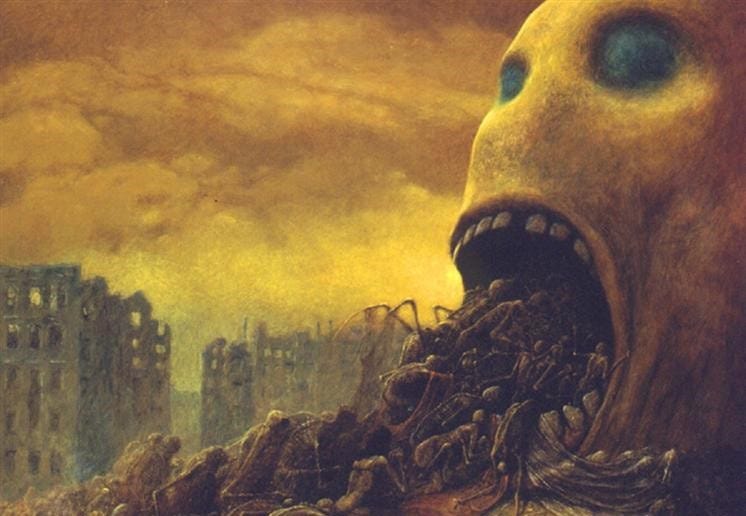This Ideology Is Destroying Our World. Dare We Name It?
It's not humans who are wrecking the planet, but a poisonous doctrine we've been programmed into believing, argue George Monbiot and Peter Hutchison in a new book.
This is Edition #8 of The Climate Laundry. Please consider becoming a paid subscriber if you find my work valuable and you have the means.
From Voldemort to the Candyman, the idea of a force so malevolent that it must not be named is an enduring cultural trope. It descends from the belief, common to many societies, that names themselves hold great power. By naming the entity, we risk summoning it—yet, paradoxically, only in naming it can that entity be vanquished.
So it is with neoliberalism, say environmentalist George Monbiot and filmmaker Peter Hutchison in their new book, The Invisible Doctrine: The Secret History of Neoliberalism (& How It Came to Control Your Life). It’s both harmful and absurd, the writers contend, that the most of the world’s people, the majority of whom languish in neoliberalism’s sway, can neither name it nor know what it is. But it is this system that is responsible for compounding—and in many cases, creating—human injustices worldwide, as well as many of the crises that are threatening life on Earth.
The harms of neoliberalism can be found everywhere, but the doctrine has found its most ardent adherents and its purest, most enduring expression in Anglophone countries like the US and Britain. It’s at the root of why Britain has the highest rate of homelessness in the developed world,1 and British rivers and lakes are overflowing with human waste.2 It’s why the for-profit US healthcare system drives millions of people into bankruptcy,3 and how the fossil fuel lobby prevents effective climate action.4
And yet, Monbiot and Hutchison write, most people can’t readily identify the toxic ideological system causing this society-wide sabotage. That’s no accident. The authors show that the genius of the neoliberalism’s evangelists lay in their recognition that giving their baby a name would put it in danger. By the 1980s, the doyens of the Mont Pelerin Society—the group that birthed and continues to champion neoliberalism as we know it—had stopped using the term altogether. Indeed, take a look at the Society’s about page today, and you’ll find no mention of it. Yet, unseen and unspoken, its precepts define everything, from our purchasing decisions to the choices our politicians make.
Neoliberalism is an ideology that venerates the individual above all else: the doctrine’s chief architect, Friedrich Hayek, believed that any policies that benefit the masses, such as welfare programmes, would inevitably cause a state to metamorphose into Stalinesque tyranny. Instead, the neoliberals believed, individual action must be enshrined above that of the collective, so taxes must be slashed, unions crushed. Regulations that protected the public should be eliminated, and benefits should be scrapped. Hayek and others created “a heroic narrative of extreme wealth”, in which the ultra-rich were cast as bold pioneers who should be “free to do the undoable, without constraint from public interest or public opinion”. Take a look at our media today, with its frothing veneration of the rich, and the success of neoliberal propaganda is instantly laid bare. (The publication for which this author is a contributor is perhaps the cardinal offender in this regard.)
Keep reading with a 7-day free trial
Subscribe to The Climate Laundry to keep reading this post and get 7 days of free access to the full post archives.





